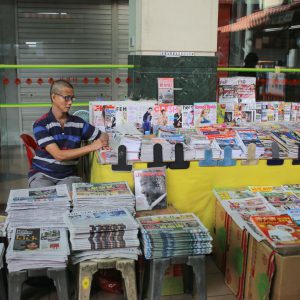Uncovering alternative ‘journalism crisis’ narratives in Singapore and Hong Kong: When state influences interact with Western liberal ideals in a changing media landscape
October 31, 2022

On 31 October 2019, GARAGE, a digital news portal initiated by the Business Times, was awarded the Gold for the Best Digital News Start-up at the World Association of News Publishers (WAN-IFRA) Asian Digital Media Awards (‘BT’s Garage grabs startup gold at Asian Digital Media Awards‘ (The Business Times, October 2019)). GARAGE provides daily coverage on Singapore’s start-up ecosystem, providing analysis, opinions, and profiling new start-ups that have just embarked on their business and are keen to succeed.
The Business Times, like the more familiar The Straits Times, is a news portal published under Singapore Press Holdings (SPH), a company that has close ties to the Singapore Government. This ensures that the news in Singapore can be regulated by the state.
Media regulation is not uncommon. In the West, the term ‘journalism crisis’ is used to describe such media surveillance and the media’s loss of freedom to report objectively. ‘Journalism crisis’ is understood through various ‘crisis narratives’, which intersect and influence each other. These include the awareness that capitalist elites may withhold or manipulate information in the media to serve their private interests rather than public interests, the civic inadequacy of the press, and the loss of public confidence in the media.
In “Uncovering alternative ‘journalism crisis’ narratives in Singapore and Hong Kong: When state influences interact with Western liberal ideals in a changing media landscape” (Journalism, 2018), Dr Wu Shangyuan (NUS Communications and New Media) uses a framework of ‘crisis narratives’ to reveal the complexities of factors that might be causing fears of a journalism crisis in Singapore and Hong Kong. Dr Wu conducted structured surveys and in-depth interviews of journalists in Singapore and Hong Kong to get their views on the censorship and reporting issues they encounter on a daily basis, the roles an ideal news media system should perform, and whether they perceive their state’s media to be in a journalism crisis. As former British colonies, both city-states have been exposed to and are still partly under Western influence, yet they are also subjected to a fairly authoritarian system of governance, making them ideal for study and comparison.
Results revealed that despite more freedom given to the media in Hong Kong, a crisis in journalism is seen as more severe in Hong Kong (according to 71.3% of respondents) than in Singapore (according to 43.8% of respondents). Dr Wu posits that an additional ‘crisis of legitimacy’ exists in a non-western journalism crisis narrative where there is some authoritarian control in the media. The crisis of legitimacy arises when the government’s ideology does not resonate with its people. This occurs in Hong Kong, which had already flourished under British rule before the 1997 Chinese handover. The Chinese have been unsuccessful in imposing their ideology in Hong Kong, which has caused a greater fear of an existing journalism crisis there, both real and imagined. This fear gets perpetuated when Hongkongers hear about strict regulations in the media, outright acts of self-censorship, and gossip about journalists being assaulted.
In contrast, the rhetoric about ‘Asian values’ and ‘survivalism’ used by Singapore’s government after independence has successfully connected with Singaporeans. These ideologies helped to build respect and compliance towards authority, allowing the government to regulate the media at their will. In turn, achieving sustained stability and wealth for Singaporeans reinforced the government’s legitimacy and enabled their sustained control of the media. The Singaporean journalists who were interviewed reiterated this mindset. They expressed the need for journalism to play a ‘collaborative role’ with the state despite noting the lack of political criticism and investigative stories in the media. Singaporeans acknowledge the state’s media regulations, but are content to relinquish some forms of freedom to ensure social order and progress.
Read the article here.
